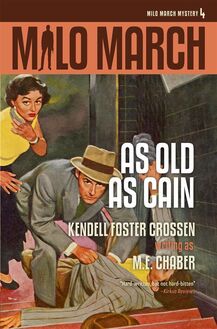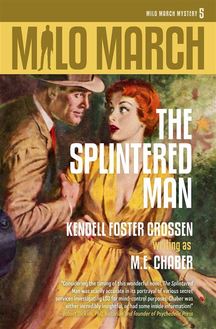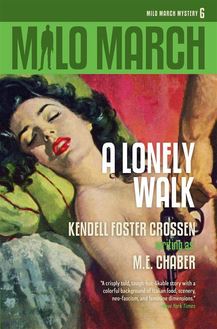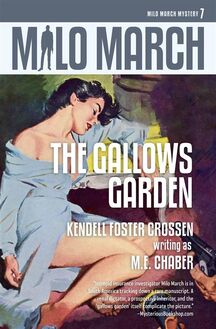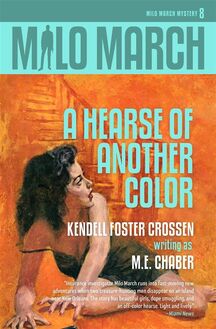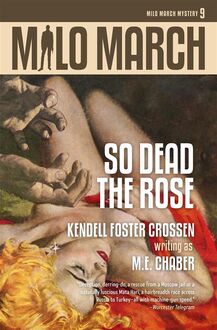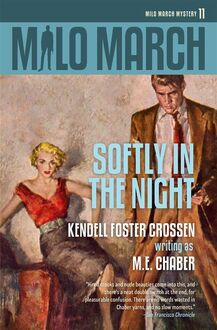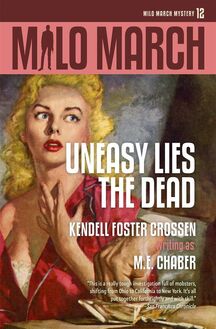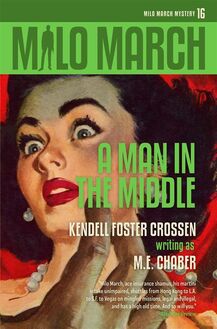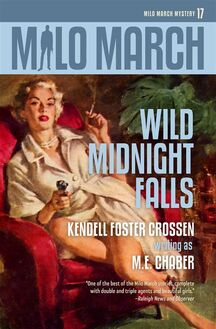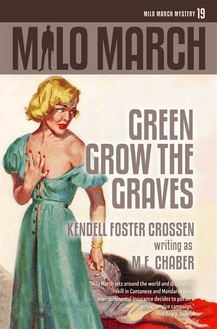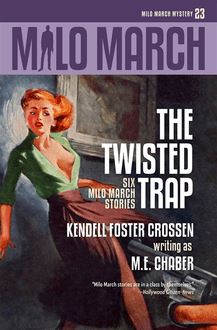-
 Univers
Univers
-
 Ebooks
Ebooks
-
 Livres audio
Livres audio
-
 Presse
Presse
-
 Podcasts
Podcasts
-
 BD
BD
-
 Documents
Documents
-
- Cours
- Révisions
- Ressources pédagogiques
- Sciences de l’éducation
- Manuels scolaires
- Langues
- Travaux de classe
- Annales de BEP
- Etudes supérieures
- Maternelle et primaire
- Fiches de lecture
- Orientation scolaire
- Méthodologie
- Corrigés de devoir
- Annales d’examens et concours
- Annales du bac
- Annales du brevet
- Rapports de stage
La lecture à portée de main
Vous pourrez modifier la taille du texte de cet ouvrage
Découvre YouScribe en t'inscrivant gratuitement
Je m'inscrisDécouvre YouScribe en t'inscrivant gratuitement
Je m'inscrisEn savoir plus
Vous pourrez modifier la taille du texte de cet ouvrage
En savoir plus

Description
Then Intercontinental Insurance gets the bright idea to hire its best investigator, Milo March, to capture the killer―as a public service, of course. They are determined to prove that a large corporation can have a soul, and they’re going to do it even if it kills Milo.
But it won’t. Milo will crisscross the country and the globe in search of the truth: Cleveland, Columbus, San Francisco, Los Angeles, Reno, Lisbon, New York City, Hong Kong, Cape Town, Paris... even a little old mining town in Arizona. All the while he is dogged by a sneering white-haired gangster determined to get to Crown before Milo does―to shut him up.
Milo doesn’t believe that Eugene Crown is the real culprit. He was a born loser by all accounts, and now, suddenly, he’s a master criminal? Clearly Crown is no more than a pawn in a well-organized game of death.
But why the Congressman? Because he was for civil rights? anti-Communist? anti-union? pro-Israel? There had to be an international conspiracy behind the deed, a group of men with a lot of money and one simple idea in common: Stir things up. Put the blame on the Left, the Right, the blacks, the whites, whoever—but scare everybody so that the men can get the things they want....
Sujets
Informations
| Publié par | Steeger Books |
| Date de parution | 10 mai 2021 |
| Nombre de lectures | 0 |
| EAN13 | 9791220802413 |
| Langue | English |
Informations légales : prix de location à la page 0,0012€. Cette information est donnée uniquement à titre indicatif conformément à la législation en vigueur.
Extrait
Green Grow the Graves
by
Kendell Foster Crossen
Writing as M.E. Chaber
With an Afterword by Kendra Crossen Burroughs
Steeger Books / 2021
Copyright Information
Published by Steeger Books
Visit steegerbooks.com for more books like this.
©1998, 2021 by Kendra Crossen Burroughs
The unabridged novel has been lightly edited by Kendra Crossen Burroughs.
All rights reserved. No part of this book may be reproduced or utilized in any form or by any means, electronic or mechanical, without permission in writing from the publisher. The scanning, uploading, and distribution of this book via the Internet or via any other means without the permission of the publisher is illegal and punishable by law.
Publishing History
Hardcover
New York: Holt, Rinehart & Winston (A Rinehart Suspense Novel), February 1970. Dust jacket by Stan Zagorski.
Toronto: Holt, Rinehart & Winston of Canada, February 1970.
London: Robert Hale, April 1971.
Paperback
New York: Paperback Library (63-568), A Milo March Mystery, #19, April 1971. Cover by Robert McGinnis.
Dedication
For Bo—
who is more Bojangles than Beauregards,
and for Melody—
who is one.
Author’s Note
This is the story of two men who never met and had nothing in common yet were wedded together in a bloody pageantry of puppets, neither of them aware of the invisible figures who were back of the stage pulling the strings. All characters portrayed in this novel are fictional and are not meant to represent anyone living or dead. Only the climate of violence is real in a world which has seen too much of it over the centuries.
M.E.C.
One
It was a warm day in Cleveland, Ohio. Most of the men who had gathered in the park for the political picnic wore sport shirts and no jackets. Their wives wore light summer dresses. The men on the platform, however, wore jackets and ties, pretending they felt comfortable.
Portable ovens stood around the tables, keeping the food hot, while white-jacketed servers waited to put the food on the tables the minute the speakers were through.
It was a friendly crowd, applauding in the right places and laughing at the familiar jokes, although now and then a few of the men would glance wistfully at the ovens. A few beers would have helped them wait, but there were only soft drinks. As one man said in an undertone to the man next to him, “You can’t drink much of this stuff before it starts coming out of your ears.” His neighbor nodded and grinned in appreciation.
There were five men on the platform. Four were local politicians and one was from a neighboring state. Four were there to help the local man who sat in the center. He was running in a special election for the United States Senate, and it was generally agreed that he needed help. The crowd had already heard two speakers, and the third seemed about to finish.
“… and we all know,” he said, “with what unswerving courage and faithfulness Jerry Hayes has served the people of Ohio during his long political life, and I know he will continue to do so as long as there is a breath left in his body. It is in trying times such as we now face that we need men like Jerry Hayes down there in the United States Senate. Once we have put him there, we can be sure that every minute of every day he will be doing his best for the great state of Ohio and for the United States of America.” He stopped and took a drink of water from a glass on the lectern in front of him. He put the glass down and looked at the audience.
“And now,” he continued, “I want you to meet a man who has worked closely with Jerry Hayes, knows his ability and integrity, knows his contributions and his sacrifices for his state and country. You know the man I’m about to introduce to you. You know him well. You’ve listened to him on radio, watched him on television, and read his speeches in the newspapers until you probably feel that you have known him all of your lives even though he does not come from Ohio but from one of our great neighboring states. I give you the Honorable John Randolph.”
There was considerable applause as the man seated at the end stood up and came to the center of the platform. He was a tall, handsome man, no more than forty, although his wavy hair was already quite gray at the temples. He was well dressed and the only one there who seemed not to mind the heat. As he reached the lectern, he held up his hands to stop the applause.
“My friends,” he said, “—and I have many friends in this great state—my only regret is that I can’t spend more time here so that I could get to know more of you. That, as you must know, is one of the wonderful things about being in political life. We make so many, many friends. Of course, we make a few enemies, too.”
As he waited for them to laugh, smiling back at them, one realized how often his handsome face had been seen on television or in the pages of the newspaper, how many times that mellow voice had been heard on radio, television, and at meetings such as this. It was impossible not to wonder, as his colleagues did constantly, what he wanted. It was said that he traveled more than anyone in Congress, making speeches wherever he was wanted or wherever they would have him. The networks knew that he could be counted on to appear on television even if asked at the last minute. Did he want to move from the House to the Senate? Or did his desires go further than that?
“I am going to talk to you today,” he went on, “not about politics but about America and Americans. That is the kind of talk Jerry Hayes understands and appreciates. He knows, and I know, that we need more of that kind of talk in both the lower and upper houses. We need men who are not afraid to talk about America and Americans.”
He stopped again and there was applause.
“You know me,” he cried. “John Randolph. There has been a Randolph in every generation in public service since the first Randolph in the very beginning of this nation. My ancestors owned black slaves. They also owned some white people who weren’t much better than slaves. They couldn’t quit working for us unless we said they could. But we were a poor nation, just beginning then. Now we’re the richest and the strongest and the greatest nation in the world. I say let every American who wants to be an American share in this wonderful country.
“Of course, they have to earn their share just like I did and you did. But they’ve got to have the right to do it. We can’t hand it to them on a silver platter, but we can see that they have the right to get an education and to get the same jobs that you and I get. And they’ve got the right to get the same salary, and we have to see that they get it. When we do that, they won’t have to pay a lot of money to some union to tell them what to do and when to do it, some union that will tell them to go out on strike and make them lose more in wages than they’ll get in any raise.
“If I didn’t believe in America for Americans, whether they’re black or white or green, and if I didn’t fight for that belief, what do you think would happen when I go up to meet my Maker? All those Randolphs who helped to set up this country so it could grow the way it has, they’d just look at me and want to know what I was doing there. And about all I could say was that I had spent most of my life in the Lower House and that I thought maybe I’d get a chance to sit in the Upper House.”
While the audience laughed, one of the men sitting on the platform leaned over to the man next to him. “Sometimes,” he said, “I can’t tell whether it’s Jerry or Randolph who’s running for the Senate.”
“A moment ago,” Randolph continued, “another speaker told you that Ohio needed Jerry Hayes down in Washington. I say amen to that. I also say that Washington needs Jerry down there. We need all the men like Jerry Hayes we can find.”
This time the applause was loud. Randolph waited with a friendly smile until it died out.
“I sat,” he said, “in the House with Jerry Hayes for six years. He worked with me on civil rights bills, on urban renewal bills, on antipollution bills, on anticrime bills to make the streets safe for our women and children, on anti-Communist bills, on bills to curb the power—and the abuse of that power—of unions. And I can stand here and tell you that there was never a finer man to work with than Jerry—”
It sounded like a firecracker. So much so that several people looked toward the street to see if there were any children playing there.
When they looked back, the first thing they saw was the blood streaming down the speaker’s face. Before the meaning of it could sink in, Randolph leaned forward as though he were bowing to the audience. Then, swiftly, he fell from the platform, taking the lectern and the microphone with him.
A woman screamed like a high-pitched trumpet.
Two
The morning was hot and sticky in New York City. I was sitting in my office with my coat off, my feet up on the desk, reading the morning newspaper. Almost a month had passed since the assassination of Congressman John Randolph, but he was still making the front pages almost every day. Most of it wasn’t really news, but it was the absence of news that made the papers.
They thought they’d identified the man who shot Randolph. They said his name was Eugene Crown and that he was a convict who had escaped from prison only a few weeks before the killing. They claimed to have found the murder rifle with his prints on it and to have found his car abandoned in Akron, Ohio. The police of every city and every state were working on it. So were the FBI. Nobody seemed to have any idea why he’d shot Randolph. And they didn’t have Crown. He’d been
-
 Univers
Univers
-
 Ebooks
Ebooks
-
 Livres audio
Livres audio
-
 Presse
Presse
-
 Podcasts
Podcasts
-
 BD
BD
-
 Documents
Documents
-
Jeunesse
-
Littérature
-
Ressources professionnelles
-
Santé et bien-être
-
Savoirs
-
Education
-
Loisirs et hobbies
-
Art, musique et cinéma
-
Actualité et débat de société
-
Jeunesse
-
Littérature
-
Ressources professionnelles
-
Santé et bien-être
-
Savoirs
-
Education
-
Loisirs et hobbies
-
Art, musique et cinéma
-
Actualité et débat de société
-
Actualités
-
Lifestyle
-
Presse jeunesse
-
Presse professionnelle
-
Pratique
-
Presse sportive
-
Presse internationale
-
Culture & Médias
-
Action et Aventures
-
Science-fiction et Fantasy
-
Société
-
Jeunesse
-
Littérature
-
Ressources professionnelles
-
Santé et bien-être
-
Savoirs
-
Education
-
Loisirs et hobbies
-
Art, musique et cinéma
-
Actualité et débat de société
- Cours
- Révisions
- Ressources pédagogiques
- Sciences de l’éducation
- Manuels scolaires
- Langues
- Travaux de classe
- Annales de BEP
- Etudes supérieures
- Maternelle et primaire
- Fiches de lecture
- Orientation scolaire
- Méthodologie
- Corrigés de devoir
- Annales d’examens et concours
- Annales du bac
- Annales du brevet
- Rapports de stage
